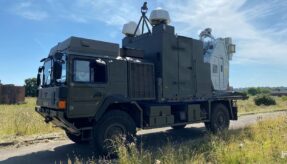
The Galileo system provides Europe and the UK with Global Navigation Satellite System data for military, critical national infrastructure and blue light services. Here, Nigel Davies, Head of Secured Navigation at QinetiQ, explains the increasing threat to GNSS and how QinetiQ is helping tackle them.
Europe’s Global Navigation Satellite System (GNSS) programme, Galileo, was designed to be compatible with all such satellite systems and interoperable with both GPS and Russia’s GLONASS space-based satellite navigation system. Through this design, Galileo is enhancing the global satellite coverage available – providing a more seamless and accurate experience for multi-constellation users around the world.
These users include workers in critical national infrastructure and blue light services as well as members of the Armed Forces, who need to deliver synchronised operations across the air, land and maritime domains.
Dr Nigel Davies, Head of Secured Navigation at QinetiQ, commented: “QinetiQ has had a long involvement in the provision of high-performance robust receivers and we have detected over the last few years that as the use of GNSS has increased, so has the interest in attacking or thwarting it, just as greater use of the internet has also seen an increase in viruses and hacking phenomena. When it comes to cyber threats there is a wide landscape – from low-level criminal activity through to state actors and the military.”
The threat to GNSS, Dr Davies explained, includes jamming and spoofing. Jamming can involve anything from personal privacy devices that thwart vehicle-tracking devices to battlefield technology. Jamming devices are used to deny service, and to stop the receiver working correctly and producing the correct navigational code.
Spoofing, on the other hand, is where someone generates a simulated signal that the receiver treats as a real one, resulting in denial of service or a misleading output from the receiver.
Dr Davies said: “In the military context – and in the most extreme circumstances – spoofing and jamming can result in a weapon being stopped from hitting its intended target, or even being delivered to the wrong target.”
He added: “The GNSS jamming threat has been long present and recognised and the military have long been aware of it, so the military uses encrypted signals to protect data against spoofing. Open GNSS signals and services are vulnerable to spoofing unless you use mitigating systems. Also the technology that people are using to build spoofers has matured, so they can build them within reasonable costs and time frames; there are even online guides to building spoofers.”
To combat this threat, the UK Ministry of Defence has become very active in monitoring and anticipating the changing threat environment. One of the ways in which it is doing this is by working on the ASPIRE project with QinetiQ.

Dr Davies explained: “QinetiQ is working in an innovative collaboration to tackle GNSS threats on the ASPIRE project. This project uses cloud-based technology to authenticate the navigation from GNSS signals. Rather than having a receiver capable of processing the encrypted signals at the user end, we can collect these signals that we receive off-air and then send them back to a secure processing facility that can calculate the position and make sure that it is authenticated using an encrypted service. This is useful for things like critical national infrastructure.”
ASPIRE’s cloud-based approach allows potentially very low-cost, low-power sensors to be integrated into user devices. This enables the system to provide safety and security to a wide range of tracking, audit and surveillance applications, from monitoring personnel location and authenticating satellite-based timing sources through to tracking high-value assets.
Dr Davies said: “It is useful for things like tracking offenders who have been tagged. In the case of offender tracking tags the danger would be that the offender would try to use a spoofer to provide a false signal, suggesting they were within the area allowed by their probation order, when they were not.

PRS Accessed via Cloud to Power Drone
“While you would need to ensure that the offender’s tag signal was not being spoofed, you would also not be likely to put a receiver in an offender’s house, so you need a way of tracking them and storing the receiver elsewhere.
“Using the ASPIRE technology, even a low-cost tag could provide data that QinetiQ could send back to a secure processing facility, allowing us to make sure that the offender is where they should be.”
QinetiQ is undertaking innovations in new technologies to continually develop low size, weight and power devices in a cost-effective way.
Dr Davies expanded: “In terms of combating jamming you can use multiple GNSS services, constellations and frequencies to increase the robustness and advance signal processing technology in your receiver in order to detect and mitigate some of these signals.
“This technology uses anti-jam antennas; these are antennas with multiple elements that can actually detect the direction of the arrival of the jammers and steer the signals away from that direction to mitigate the effect of the jamming.”
There is a growing interest in GNSS signals, and thought leadership has come from the UK and US with a number of groups in government and academia leading the field.
Dr Davies said: “We are also seeing new developments across Europe and the Korean Peninsula. In China the government is developing its own global satellite navigation system called BeiDou; similarly to GPS and Galileo, BeiDou has its own encryption signal systems that we expect the Chinese authorities to use for their military and governmental operations.”
He concluded: “There is a global opportunity in the GNSS marketplace worth tens or hundreds of millions of pounds over the next decade.”
If you would like to join our community and read more articles like this then please click here








